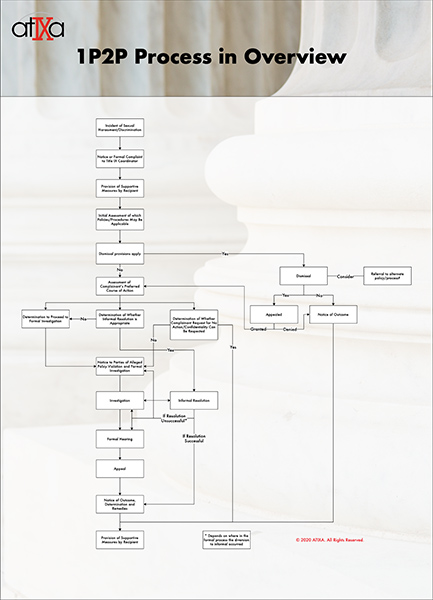Title IX
Title IX Legislation
"No person in the United States shall, On the basis of sex, be excluded from participation in, or be denied the benefits of, or be subjected to discrimination under any education program or activity receiving federal financial assistance.”
- Title IX of the Education Amendments of 1972
What is Title IX?
Title IX of the Education Amendments of 1972 (Title IX), 20 U.S.C. §1681, prohibits discrimination on the basis of sex in educational programs and activities. All colleges and universities receiving federal funds must comply with Title IX . Under Title IX , discrimination on the basis of sex can include sexual harassment, gender-based harassment, and sexual violence. Additionally, Title IX requires higher education institutions to have in place procedures to respond promptly and effectively to allegations of sexual harassment, gender-based harassment, and/or sexual violence.
Grayson College is committed to compliance with Title IX, which prohibits dating violence, domestic violence, retaliation, sex discrimination, sexual assault, sexual harassment, and stalking in federally funded education programs and activities.
Statement of Non-Discrimination
Grayson College complies with the Title IX Education Amendments of 1972 which prohibits discrimination, including harassment, against any student on the basis of sex in any educational program. Procedures are in place to respond top allegations of sexual harassment, discrimination, and violence. Grayson College strives to maintain a healthy and safe environment where all members of its campus community play a vital role in preventing acts that violate Graysons College's Core Values of balance, trust, clarity, teamwork, service, and gratitude.
Sexual Harassment and Violence
Grayson College prohibits any form of sexual harassment and sexual violence. Grayson College strives to maintain a healthy and safe environment where all members of its campu s community are treated with dignity and respect. Read more about how to report Sexual Violence.
Retaliation
Retaliation against anyone involved in the complaint process is a violation of Grayson College policy and is prohibited All incidents of retaliation should be immediately reported to the Grayson College Title IX coordinator or Title IX Deputies.
These prohibited acts and grievance procedures are defined in the Student Handbook .
Explore Title IX resources provided by Grayson College, the State of Texas, and the federal government.
Report Title IX Violations
Prohibited conduct should be promptly reported to either the Title IX Coordinator or any of the Grayson College Deputy Title IX Coordinators. Report Title IX violations to TitleIX [at] grayson [dot] edu .
Any College District employee who suspects or receives notice that a student, or group of students, has or may have experienced conduct prohibited by Title IX policies is required to immediately notify the Title IX Coordinator or Title IX Deputy Coordinator, or appropriate college district office.
Grayson College will promptly investigate and address reported incidents of prohibited conduct using the appropriate procedures stated in the Student Handbook . The student’s report will be submitted to Grayson College’s Title IX coordinator who will proceed with the Grayson College Title IX process.
Once Grayson College knows, or reasonably should have known, that an incident of prohibited conduct has occurred, the college MUST respond and investigate the matter. Grayson College will follow its policies and procedures, even if the victim does not wish to pursue action with the college or the criminal justice system.
Students can submit an anonymous report of prohibited conduct. However, doing so may limit Grayson College’s ability to thoroughly investigate the matter, respond appropriately, and stop the behavior from reoccurring. Also, victims have the right not to report a crime if they so choose.
Exceptions
A person who holds a professional license requiring confidentiality, serving as mental health counselor, or is supervised by such a person, is not required to disclose a report of prohibited conduct without the student's consent.
Grayson College Title IX Officials
Title IX Director
-

Dr. Erin Howard
Director of Title IX and Student ConductContact
Phone Number: 903-415-2614Email: howarde[at] grayson [dot] eduOffice Location: Student Life Building
Title IX Deputy Coordinators
-
Dr. Logan Maxwell
Vice President of Student ServicesContact
Phone Number: 903-415-2666Email: maxwelll[at] grayson [dot] eduOffice Location: Student Affairs Building -

Mike McBrayer
Director of Athletics/Women's Softball CoachContact
Phone Number: 903-463-8753Email: mcbrayerm[at] grayson [dot] edu -
Shantee Siebuhr
Director of Student Life & DevelopmentContact
Phone Number: 903-463-8693Email: siebuhrs[at] grayson [dot] eduOffice Location: Student Life Center -

Robyn Voight
Director of Human ResourcesContact
Phone Number: 903-463-8648Email: voightr[at] grayson [dot] eduOffice Location: Student Affairs Building -
Dr. Ilene Walton
Dean of South CampusContact
Phone Number: 903.415.2646Email: waltoni[at] grayson [dot] eduOffice Location: South Campus
Sexual Misconduct Liaison & Pregnancy, Parenting, and Related Conditions Liaison
-

Barbara Malone
Director of Counseling and Social ServicesContact
Phone Number: 903-463-8730Email: maloneb[at] grayson [dot] eduOffice Location: Student Life Building, Counseling
Bystander Intervention
Members of the Grayson College community are responsible for preventing sex-based discrimination, sex-based harassment, and sexual violence.The entire campus community plays a vital role in preventing acts that violate Graysons College's Core Values of balance, trust, clarity, teamwork, service, and gratitude.
Bystander intervention occurs when a witness speaks up and/or steps in to stop a potentially dangerous situation. Bystanders often do not become involved in a situation because they do not know what to do, are worried about their own safety, or think other witnesses will intervene. As a friend, classmate, partner, family member, etc., you are in a unique position. You have the power to intervene and stop an incident before it occurs. You can use your power to stop a potentially dangerous situation.
- Educate yourself and others about gender inequality, prohibited conduct, the causes of violence, healthy relationships, and consent to sexual activity.
- Challenge the myths surrounding violence and prohibited conduct.
- Understand how your attitudes and actions may perpetuate these myths, and work toward changing them.
- Don't make excuses for other people's inappropriate behavior.
- Don't blame the victim.
- Gently offer support if you suspect someone close to you has been a victim of violence.
Watch this short video about the I Got Your Back Project
Title IX Process

Complaint Submission and Intake
- Complaint Submitted to Title IX Director
- Supportive Measures Provided
Do dismissal provisions apply to the case?
- If Yes, Dismissal will be considered along with a referral to alternate policy or Process.
- If No, continue to Assessing Complainant’s Preferred Course of Action
Assessing Complainant’s Preferred Course of Action
Request for No Action/Confidentiality
Does the complainant wish for no action or confidentiality, and is it possible?
- If yes, supportive measures are provided
- If no, proceed to formal resolution
Informal Resolution
Is an informal resolution appropriate, and does the Complainant prefer an informal resolution?
- If yes, matter is resolved informally and matter proceeds to Resolution.
- If no, proceed to formal resolution.
- If informal resolution is unsuccessful, proceed to formal resolution
Formal Resolution
- Notice to Parties of the alleged policy violation and formal investigation
- Proceed to formal Investigation
Formal Investigation
- Investigation
- Formal Hearing
- Appeal Process
Resolution
- Notice of Outcome, Determination and Remedies
- Supportive Measures provided to both parties
Dismissal
- Consideration of referral to alternative policy or procedures
Is dismissal appealed?
- If yes: proceed to dismissal appeal
- If no: proceed to Resolution
Dismissal Appeal
Is the appeal granted?
- If granted, proceed to Assessing Complainant’s Preferred Course of Action
If denied, proceed to Resolution
Pregnant, Parenting, and Related Conditions
Students that are pregnant, parenting, and/or experiencing related conditions have specific rights and resources provided. Read more information about your rights as a pregnant or parenting student . All employees are required to give the Title IX coordinator contact information to any student, or representative of a student, that shares they are pregnant. Read full information about Grayson College Title IX and pregnancy, parenting, and related conditions. If you are in need of support, there are resources to support your success at Grayson College. This is non-title IX support provided by Grayson Cares.
Reporting Requirements under Tex. Educ. Code § 51.253(c)
For the purposes of complying with the Chief Executive Officer’s reporting requirements under TEC, Section 51.253(c), the 2023-2024 Summary Data Report includes all of the required reporting information for the time period of October 16, 2023 through October 15, 2024.

